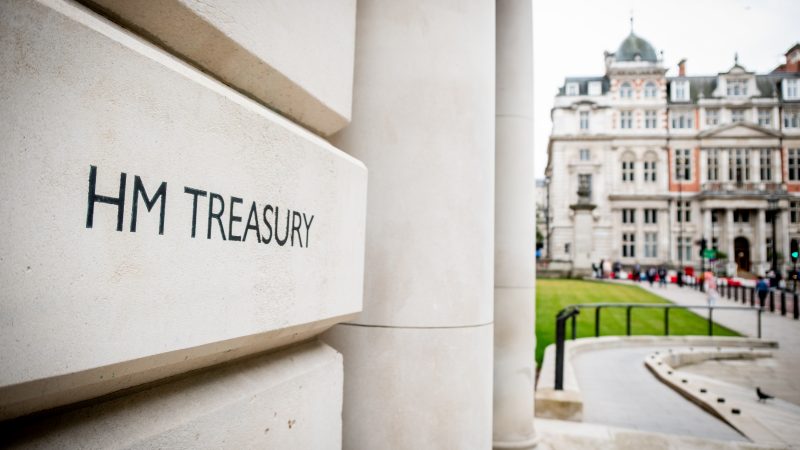
One of the Treasury’s most senior mandarins under past Labour and Tory administrations has warned Labour must not get “too obsessed” with fiscal rules, and questioned whether the party had needed to drop its £28bn green investment pledge.
But Nick Macpherson argued in an interview with The Power Test podcast this week that Rachel Reeves’ long-term economic strategy “will be music to the Treasury’s ears” and claimed that the “stability” offered by Labour “may already be affecting the markets”.
Macpherson – who served as Treasury permanent secretary under former Chancellors Gordon Brown, Alistair Darling and George Osborne – said his guess is that Labour “will, and so they should, borrow a bit more in order to invest”.
“Providing that investment programme is focused on what really matters and is then seen through, I don’t see that as a great problem in terms of the public finances. Indeed, some would argue that Labour may be being too cautious,” the peer added.

But Macpherson said he “can understand why they’re doing what they’re doing”, telling podcast hosts Sam Freedman and Ayesha Hazarika: “The case for being tough now, potentially it gives them room for manoeuvre. It gets them credit with the financial markets which, actually, is even more important today than it was in 1997.”
He added: “I suspect it may already be affecting the markets. I think one reason why sterling at the moment is reasonably stable… is the markets quite like the idea of a bit of stability.
“And Starmer and Reeves in a sense represent stability compared to a political party which, day in day out, someone’s either resigning or denouncing the leadership.”
Reeves’ economic strategy ‘will be music to the Treasury’s ears’
The former Treasury official and now cross-bench peer argued that “a lot” of the economic strategy set out in the Shadow Chancellor’s Mais lecture last month “chimes with what most people in the Treasury would be advising”.
He said: “First, a serious focus on growth. I mean, to be fair [Jeremy] Hunt is also focused on growth. But I think Rachel Reeves is clearly wanting to embed a framework which will last and is very much talking about a plan which could potentially be played out over a ten-year period. I think that will be music to the Treasury’s ears.
“Because in one sense we kind of understand the sorts of drivers of growth, but the problem in the last few years has just been these extraordinary political changes which just mean that the government is endlessly relaunching itself, and so you never get the focus you need on delivering growth.”
But the former senior civil servant questioned the party’s decision to drop its £28bn spending target for its green prosperity plan, telling the podcast: “Did they have to drop the £28bn commitment?… £28bn’s not actually very much these days… It’s about 1% of GDP.
“I mean, compared to the sorts of money Nigel Lawson gave away in 1988, this is chicken feed. But I can see in an uncertain world why they just want to be a bit cautious.”
Chancellors must not get ‘too obsessed’ with fiscal rules
Macpherson also argued that fiscal rules “always end up making you do stupid things”, saying: “If I was still at the Treasury I’d be trying to get across – because I try to say this to most Chancellors – don’t get too obsessed with fiscal rules. The only people in the end who seem to care about fiscal rules are the Treasury.
“No one else really believes them. What matters is the substance. Do you have a plan? Do you have credible projections for spending and taxation which will in the end result in the deficit broadly coming down?
“Those are the things which matter. No one gives a toss about some weird rule which is about what’s going to be happening to debt in five years’ time, which you can always revise away each year because the fifth year’s always rolling forward.”
Macpherson described himself as a “relative optimist about the economy”, adding that he thinks an incoming Labour government’s economic inheritance “may just be a little bit better than the [Office for Budget Responsibility] and others are suggesting”.
He continued: “Real wages are rising, interest rates may come down this year, which will help people with mortgages and so on, and we just may see more spending in the economy, the economy growing a bit more fast and rather more revenues coming in than expected.
“So, if I’m right – I’m not always right, I can assure you – they may actually have rather more room for manoeuvre, and so they may be able to stick with the fiscal plan whilst also spending a bit more.”
He added that he thinks Labour “will have some tax increases up their sleeve of the sort which is consistent with the wider commitments not to raise the main rate, say, of National Insurance and income tax”.
The latest episode of The Power Test, in conversation with Nick Macpherson, is out on Friday.
If you have anything to share that we should be publishing about this or any other topic involving Labour, on record or strictly anonymously, contact us at [email protected].
Sign up to LabourList’s morning email for a briefing everything Labour, every weekday morning.
If you can help sustain our work too through a monthly donation, become one of our supporters here.
And if you or your organisation might be interested in partnering with us on sponsored events or content, email [email protected].




More from LabourList
Almost half of Labour members oppose plans to restrict jury trials, poll finds
‘How Labour can finally fix Britain’s 5G problem’
‘The University of the Air – celebrating 60 years of Harold Wilson and Jennie Lee’s vision’